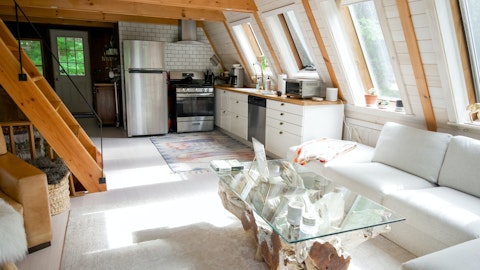Brian Chesky: Nick, let me start with pricing and then I’ll talk about the general offering. When we started Airbnb, our original tagline was a cheap affordable alternative to a hotel. And the primary reason people chose Airbnb the early days was price. Now once they used it, we used to say money as the hook but the experience is the reason you keep coming back. Because it also turns out when you stay in Airbnbs, you’re often typically in a real neighborhood, not a hotel district. You have this really cool space. You can make a meal, you have a lot more of a much more quick home. Sometimes there’s a local connection to the community, that’s what you’re looking for. But affordability has always been one of the most important benefits that we have in Airbnb.
And I do feel like we still have opportunity for our prices to be even more competitive. There’s a really interesting thing we discovered. Within reason, generally, when host lower the prices, they tend to make more money. And this is typically not true of hotels, right? Because if you’re running at 80% occupancy and you lower your prices per night, you typically don’t have a lot more room to make up the lower prices with higher occupancy and you’ll typically lose money. But many of our hosts run at low enough occupancy and they always have that if they lower the price just a bit, they can sell more nights. And so we think there’s a win-win where if we continue to encourage host to offer more competitive pricing, it’s a win for guests but it’s also a win for many of the host.
And I would also just point out that in addition to pricing tools, you need to have ample supply. Supply, I just want to highlight again, is growing 19% year-over-year. This was a huge question by the way 18 months ago. Could Airbnb re-accelerate to nearly 20% supply growth and we are approaching 20% supply growth. I think that is really, really key. So to answer your question, we’ve made huge progress in last year but prices are up quite significantly from pre-pandemic for Airbnb and hotels. We’re both up a lot. And my hope is whether or not prices come down on Airbnb further in the next year or 2, my hope is while hotels will almost undoubtedly keep increasing year-over-year, our prices will continue to be a little bit more — they’ll be more moderated.
And that goes to the next question. We actually think there’s a very high correlation of relationship between ADR and night growth and the higher the ADR, typically the lower the nights growth and the lower the ADR, typically the higher the nights growth. So there’s a trade-off there. And so we think that as we continue to be more affordable, we’ll continue to stimulate more demand. Now the interesting thing about Airbnb is that we’re not really one type of offering, right? Southwest is a budget brand. Louis Vuitton is a luxury brand. Apple is kind of like a luxury brand for like a lot of different people but they do have like premium prices. Airbnb’s offering really is one of the most unique and resilient models. I mean we are one of the most popular brands for people under 30 in travel, probably the most popular band for people under 30.
We’re also very much a family travel brand because homes accommodate families much better than typically hotels. We’re not just an urban brand. We’re a rural brand and vocational brand. We’re not just a North American brand. We’re a global brand. So one of the things we highlighted in the public is that we literally have something for everyone. But as we continue to get more affordable, I think that’s going to continue to drive a lot more growth for us.
Operator: And next, we’ll go to Ron Josey at Citi.
Ron Josey: Great. Brian, I wanted to ask a little bit about your comments on first-time bookers. I’m just trying to understand a little bit more on the drivers that are attracting these new bookers. Are they doing this directly through the brand, Airbnb, through the app and just trying to understand a little bit more as you’re expanding the pie and getting more supply and how users are coming to the site, point number one. And second question, just on probably with Experiences, there’s any update there?
Brian Chesky: Yes. I mean, David can feel free to jump in on this. But at the highest level, we generally are seeing that the vast majority of first-time bookers still come direct to Airbnb. So I’ll just kind of step back. The number one way reason people come to Airbnb is because a friend or a family member told them about Airbnb. And so we primarily grow through word of mouth. After that, then we have a lot of earned media. We have some 500,000 to 600,000 press articles a year. I mean the share of voice of Airbnb compared to most travel companies is overwhelming. We have a greater share of voice than almost all the other major travel brands combined. We also have a huge amount of presence in social media. You might have heard a few months ago about the Barbie house rented in Airbnb or the Shrek House, so we get a lot of earned media.
And then beyond that, we do these pretty big brand campaign. And the vast majority of our marketing spend that we do spend on advertising is not performance marketing, it’s brand marketing. It’s really marketing education around our unique product offering. So we do performance marketing but we think unlike other travel companies, it’s not necessarily a way to buy customers. It’s literally more like a laser that we use to hone in on balancing supply/demand and we really can use it to optimize certain markets. So a lot of it remains direct. And again, 90% of our traffic is direct or unpaid. I think that’s been pretty consistent. On Experiences, again, I don’t have anything new to share now. I’ll just say the following. We are actively working on updates to this product.
As much as people love homes, I think 84% of people who book Airbnb leave a review, give a 5 star. We even have a higher customer satisfaction experience with 94% of people leave 5-star reviews. So we haven’t updated this product yet because we just had our hands full really trying to focusing the most perishable opportunities which was recovering from the pandemic, improving our core service and addressing the needs of customers. But we should have some updates coming in the coming — obviously, coming next year and beyond on this product. And you’ll see we’re continually investing in this product.
Operator: We’ll go next to Kevin Kopelman at TD Cowen.
Kevin Kopelman: Could you touch on your vision for building more of a travel community on Airbnb and maybe the time line you expect for rolling out some of the new community features that you’ve talked about a little bit.
Brian Chesky: Kevin, yes, I think — let me just explain what I even mean by a travel community. I think one of the biggest visions that we have as a company isn’t just to be a marketplace to become but to build literally quite literally a global travel community where you can get homes and experiences and a variety of other services, all in one place. So we can provide a lot of offerings for guests and hosts. And that we can use an emerging technologies like generative AI, like take the Where the Airbnb app can be like the ultimate travel agent. So to do this, there’s a number of things that we’ve been investing in. The first thing is identity and account structure. So on most travel companies, you can book as a guest and they don’t even have account information.
And you can sign up with an account but you can also check out as a guest and they don’t have the same robust account information that we do. On Airbnb 100% of the bookers and 100% of the host have to have a verified ID on — associated to their account. They have robust profiles. About 70% of people on the guest and host side leave reviews to the other people. So this really does demonstrate how Airbnb is a little bit of a different community. We think that if we continue to invest in the profile and we can continue to invest in our system of trust, then as we learn more about guest and host, we can then match them for more types of offerings on Airbnb. And so this is, I think, really what we’re starting to see. And the reason that AI is so powerful is I’ll just cover 2 opportunities.





